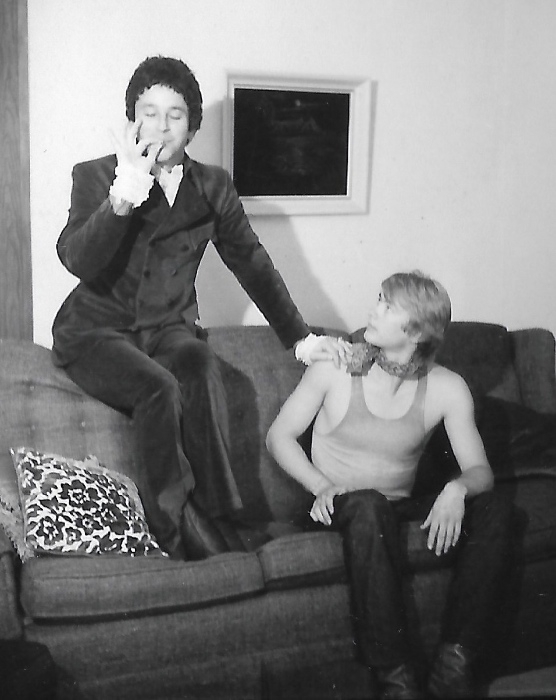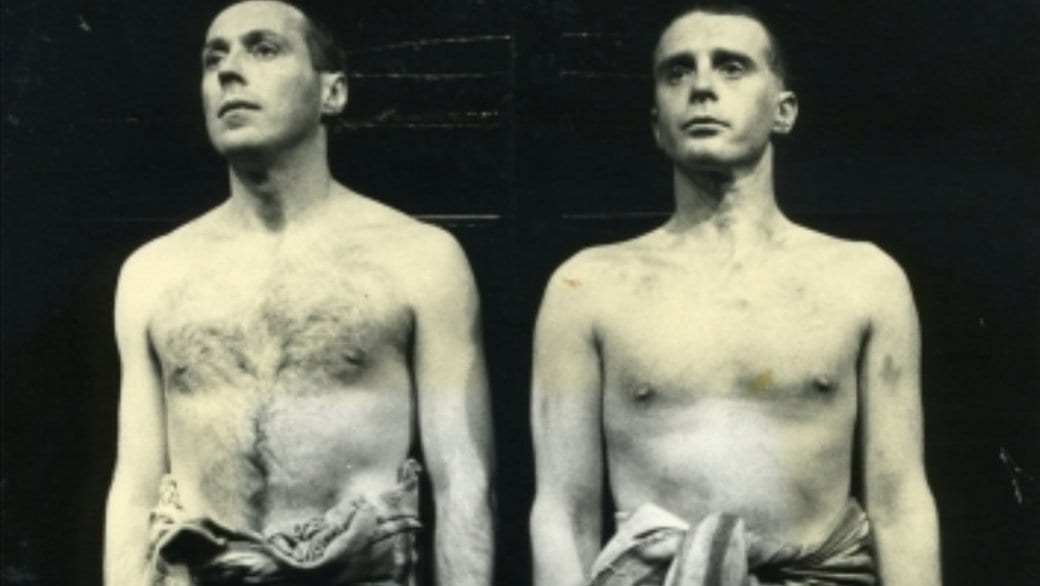This week queer playwrights, producers, and thespians from across the land are gathering at SFU Woodward’s in downtown Vancouver for Q2Q: A Symposium on Queer Theatre & Performance in Canada, a five-day confab about the history, present state, and future of queer theatre and performance in Canada.
You can count on an event like to this to send yours truly into a tizzy of nostalgia for the early signs of queerness in Vancouver’s own theatre scene. Nostalgia is what I do.
Drag was of course the first performance art to bring a taste of gayness to nightclub audiences. Before Champagne Charlie’s, our first drag venue, opened in 1969, drag artists from the US club circuit, stars of the Club My-O-My in New Orleans, the Miami-based Jewel Box Revue, and Finnochio’s in San Francisco, were bringing their gaudy shows to Vancouver’s Smilin’ Buddha on Hastings, The New Delhi on Main Street, and of course the Penthouse where anything that could sell a drink was fine by the Filippones.
Among those performers was Lee Leonard, later transitioning to Liz Lyons, whose crass, vulgar, and marginally obscene act I caught at Izzy’s Supper Club sometime in the early 1970s.
Drag was then and continues to be a mainstay of queer theatrical expression.
The first mainstream theatre performance in Vancouver that brought gays out of the closet and the clubs and into the spotlight was a 1968 production of Fortune In Men’s Eyes, a tentative experiment by the Playhouse Theatre Company at their short-lived Seymour Street Holiday Studio Theatre.
I missed that production, but was definitely on hand in 1970 for the blockbuster that really put the gay community on the front pages of the local papers, the Actors’ Contemporary Theatre production of The Boys In The Band, staged at the Magic Theatre (originally the Colonial) on Granville Street.

The 1970 production of The Boys in The Band, starring Robert Graham and Michael La France, seated, marked Vancouver’s second gay play on a mainstream stage. (Courtesy of Mary Parker)
The Boys was a silly, bitchy send-up of the most outrageous high-camp queens you could think of.
Imagine if you will a birthday party with seven gay men, a rent boy someone had brought along as a birthday gift for the guest of honour, and an unexpected drop-in appearance by the host’s straight (or was he?) former college roommate. Sounds like fun, eh?
That was The Boys In The Band. It played to straight audience’s stereotypes of camping, simpering nancy-boys and got lots of laughs at all the right lines. Lines such as:
Michael: “You’re stoned and you’re late. You were supposed to arrive at this location at eight thirty dash nine o’clock.”
Harold: “What I am Michael is a 32 year-old, ugly, pock marked Jew fairy, and if it takes me a little while to pull myself together, and if I smoke a little grass before I get up the nerve to show my face to the world, it’s nobody’s god damned business but my own. And how are you this evening?”
“Give me librium or give me meth!”
“Show me a happy homosexual and I’ll show you a gay corpse.”
Or the immortal “Who do you have to fuck to get a drink around here?”
To my ear all that campiness didn’t stand up well in subsequent productions, including one a few years ago directed by Randy Parliament at the PAL Studio Theatre where, due to casting challenges, we were asked to suspend disbelief entirely as the black character Bernard was portrayed by a blond pony-tailed woman. That was interesting.

This scan of an old newspaper review shows Glenn MacDonald in the 1970 version of The Boys in the Band in Vancouver. (Courtesy of Mary Parker)
Glenn MacDonald, now one of Vancouver’s most highly regarded set designers, played Emory, the prototype nancy boy, and recalls that the 1970 show ran for nine weeks, possibly the longest theatrical run in Vancouver up to that point.
The company’s publicist, Joy Metcalfe, who went on to become the city’s best-known society columnist and broadcaster, came up with the bright idea to recruit the Georgia Straight’s gay columnist, QQ, to coach the nine-member cast on the nuances of being gay. At the first rehearsal it was obvious to me that this cast needed no coaching — at least seven of them were already well-versed in the ways of our folk!
Maintaining the ruse that I was helping them understand gay culture, I escorted the entire cast and director John Parker to dinner at The August Club. Everyone seemed pretty much at home, except for John, for whom the highlight of the evening must have been the moment a burly leather queen came over and asked him to dance. John didn’t know what to say, where to look, or what to do with his hands, and I had to gently explain to the disappointed leatherman that John was doing research!
I enjoyed sharing that story recently with John’s widow and their daughter, who had been born a few months before the show opened.

The Facettes also emerged in the 1970s to offer their own gender-bending take on drag. (Dennis Robbins Photo)
The ’70s also saw the emergence of what later became known as gender-bending drag, with groups such as the Facettes (staff and patrons of the popular club Faces) laying the groundwork for The Stage Door Johnnies, The Waitresses (of Doll and Penny’s), celebrated safe-sex educator Sister C, the Bovines, and today’s Sisters of Perpetual Indulgence.
In 1981 the Arts Club Theatre gave us our first look at a little known facet of gay life with Bent, starring Allan Gray and John Moffat, with Alex Diakun (best remembered for his recurring role as the coroner in Da Vinci’s Inquest) portraying the cabaret drag queen. Until then the homosexual experience in Nazi Germany had been virtually unknown to the general public.
I will never forget the shocked stillness of the theatre audience during the now legendary sex scene, where the two gay concentration camp prisoners, Max and Horst, bring each other to ecstasy without ever making a single move, standing side-by-side and never looking at or touching each other while reaching a silent climax.
By the 1980s homosexuality was a hot topic and the theatre scene reflected that. Glenn McDonald and Jim Wilson produced Torch Song Trilogy in 1985 at The Cultch, Theatre Positive gave a dramatic face to a community in crisis, and numerous gay and lesbian troupes emerged that brought us our own stories and helped us share them with the wider community.
In the 1990s, these included BLT Theater and Leaping Thespians, which emerged to create original plays (the latter focused on lesbian experiences often absent from earlier male-centred productions), and of course the frank theatre company (formerly Screaming Weenie Productions), which is presenting and hosting this week’s Q2Q, as they celebrate their own 20th anniversary of bringing queer stories to life.
Happy birthday, frank!
And the drag queens played on.
Q2Q: A Symposium on Queer Theatre and Performance in Canada
July 20-24, 2016
SFU’s Goldcorp Centre for the Arts, 149 W Hastings St, Vancouver
Full schedule at q2qconference.com

 Why you can trust Xtra
Why you can trust Xtra


